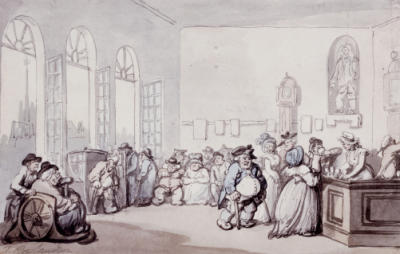
The Comforts Of Bath – The Pump Room. Thomas Rowlandson (1756-1827). Pencil, Pen And Ink And Watercolour.
Moniker/Name: tkh
Source of Question: Research
Your Question: One more question for you. I’ve been looking into “taking the waters.” Everyone speaks of Bath, but I ran across a reference that said the aristocracy was advised in the Regency period that bathing in the sea was actually better than taking the waters in Bath. Which meant bathing (dipping), as was done at Brighton. Also, different springs had very different mineral contents (depending obviously on the types of rocks they sprang from or washed down through), and so the different springs were said to be healing or healthful for different conditions.
Yet I have seen no references talk about traveling to other mineral baths. One reference claims that England has only one mineral spring (Bath); but other say England has several, Wales has one, and Ireland has many. Yet I never see references of the aristocracy traveling to Ireland or Wales to take the waters at this or that spring. Across the channel, Vichy is famous, but there are dozens of other mineral springs in France. There are even more in Germany. Hungary has Eger, Gelliert Hill, etc. And Italy, Spain, etc.
So… If someone wasn’t getting well, would they just return to their country house to decline, or travel to other parts of the UK or the continent to take the waters at a better, more healing spring? And if they traveled, would they dare France (how unfortunate to be seen as a French sympathizer, even for Vichy!), or head for Italy or some other country instead?
Thanks for the question!
There is a lot to unpack here, so I am going to do it in parts. I will post Parts II and III over the next few weeks.
The first thing I want to clarify is what “taking the waters” actually meant. Because there are baths in Bath, its easy to assume that means just bathing. While it could mean bathing, it also frequently meant consuming/drinking the waters.
Here is one author’s take on the medicinal properties of Spa waters and how to consume:
Pilgrimages to the Spas in pursuit of health and recreation; with an inquiry (1841).
This book covers many of the international (for UK) Spas and their proposed benefits by way of recommending the “valetudinarian in pursuit of health” take pilgrimages to the various spas.
The British Library has an excellent summary and a look at several guidebooks and medical tomes that recommend taking the waters.
Some of the guidebooks, like The Cheltenham Waters (1836) recommend a regime of both bathing and drinking:
Dr. William Buchanan’s Domestic Medicine (editions between 1772 and 1846) was one of the main proponents of sea bathing for conditions like the “King’s Evil“. Similarly, Dr. Richard Russell in the 18th century wrote a dissertation on the use of sea water for treatment of disease and a variety of ailments and conditions, including heavy periods.
Buchanan also recommended the taking of sulphuric waters (Spa waters) for certain conditions. Harrowgate-water, for instance, was recommended for scurvy. Bath was a known remedy for gout.
That is to say that the “cures” of bathing and drinking, both Spa water and sea water, were not mutually exclusive.
There is a great post which goes a bit more in to depth about sea bathing in the Regency era: https://austenonly.com/2010/03/20/austenprose-sanditon-group-read-a-match-for-every-disorder-sea-bathing-in-the-early-19th-century/
This post includes Buchanan’s cautions about going nuts on the Spa drinking/bath and sea bathing “cures”.
In summary, “taking the waters” was popular in the 18th and 19th century for a variety of health conditions and including bathing and drinking. Sea bathing was also another strategy for good health. There were many seaside resorts and spa towns catering to health seekers, which I will cover in the next post. In the meantime, check out some of the reference material in the links.









